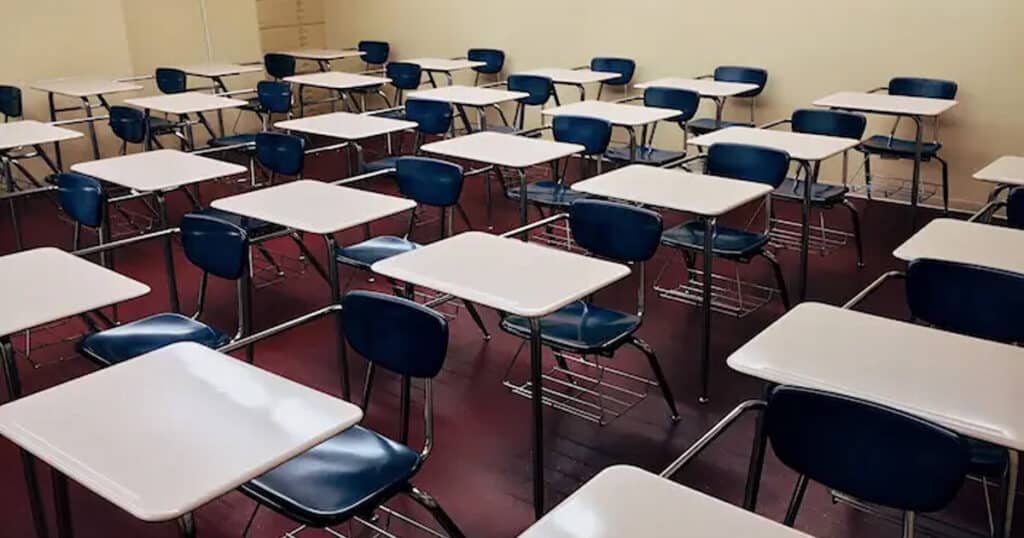
Poll: Americans say schools should focus on math, reading and writing
A large majority of voters say that public schools should focus on the basics – math, reading, writing, science and social studies – to improve the quality of public education in the country.
That’s according to the latest The Center Square’s Voters’ Voice poll conducted in late October in conjunction with Noble Predictive Insights. The poll of 2,605 likely voters includes 1,035 Republicans, 1,074 Democrats, and 496 true Independents, and is among the most comprehensive in the country.
The poll results come as the nation has seen academic achievement declines since school closures related to the COVID-19 pandemic, and as cultural debates about gender ideology and curriculum content roil parents and communities in school board meetings across the country.
Almost two-thirds of registered voters said they thought focusing on “core subject areas such as math, reading, writing, science and social studies” would improve the quality of public education, by far the top policy position supported by those surveyed.

Of those surveyed who have children under the age of 18, 55% say focusing on core subjects is essential to improving education, while 70% of parents with children over the age of 18 say the same thing.
According to Alex Nester, an investigative fellow at Parents Defending Education, some issues have taken center stage in K-12 schools nationwide at the expense of instruction time on these core subjects.
“You have all the race and gender ideology issues coming up in class that focus more on dividing students instead of bringing them together,” Nester told Chalkboard News. “And you’ve got things taking up time like social-emotional learning, surveys every morning.”
“Time in the classroom is a zero-sum game,” Nester said. “And there are lots of things taking time away from the classroom.”
Only 25% of voters said that spending more classroom time on social-emotional learning would improve education outcomes, the poll found.
Half of voters also supported teacher pay increases, according to the poll. Reducing classroom size and letting parents send children to charter or other schools using tax dollars were the next most popular policy changes, with 36% and 27% support from voters, respectively.
As The Center Square has reported this year, some states with Republican leadership have implemented or expanded school choice measures that allow parents to enroll children in private schools using public funds, which is called universal school choice by advocates.
Nester said that while some focus primarily on school choice, that can “abandon” students attending public schools. She said increasing transparency in public schools benefits parents and teachers, who may suffer from the brunt of policies made by administrators.
In August, The Center Square Voters’ Voice poll found that 51% of Americans supported some form of school choice initiatives, with 34% in favor of allowing public tax dollars to follow students and 17% supporting school choice measures for lower-income Americans.
Party affiliation played a role in what voters thought would improve schools. Seventy-one percent of GOP voters said focusing on core learning content would benefit the nation’s education system. Independents followed at 66%, and 55% of Democratic voters said it’s important to narrow in on learning.
Almost two-thirds, 63%, of Democrat voters said increasing teacher pay would create better educational outcomes. Teachers unions traditionally have had strong ties to the Democratic Party and often financially back Democratic candidates in elections. Independents followed at 47%, and only 38% of Republicans thought giving more money to teachers would be beneficial.
Other voter demographics strongly favored some policies over others. Those over the age of 65 were just as likely as Republicans, 71%, to say focusing on core content would benefit schools, followed by those between the ages of 55-64 at 67%. Respondents over 65 were also more likely to say non-public school options and cutting summer breaks would benefit the quality of education than any other age group.
Voters in the South and West regions of the country were more likely to favor focusing on the basics, with 64% of voters in those regions backing that policy change compared to 62% in the Midwest and 57% in the Northeast.
Black voters were also most likely to say giving teachers a salary increase would benefit the quality of education students receive, at 61%, compared to 49% of White voters, 49% of Hispanic voters and 46% of other voters questioned.
Voters with college degrees were more likely than those without degrees to support using tax dollars for non-public school options, 30% to 25%. More college graduates supported reduced class sizes and longer school days than voters without degrees.
The Voter’s Voice poll also found that most voters were more satisfied with their local schools than the nation’s school system, signaling a discontent with America’s education quality more broadly.


